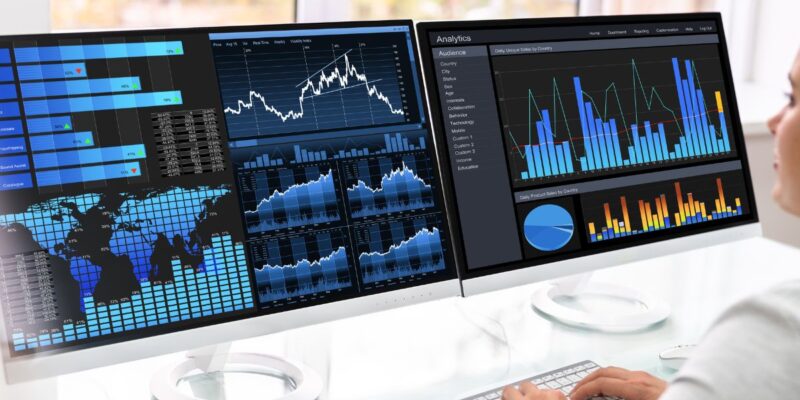Artificial Intelligence (AI) has driven a dramatic shift in various industries, most notably in marketing analytics. AI’s profound impact on predictive analytics, in particular, is helping marketers create more precise strategies by forecasting future trends. This blog post dives deeper into the intersection of AI and predictive analytics, exploring this combination’s transformative power in the marketing world.
Predictive Analytics: Understanding the Basics
Predictive analytics leverages data, statistical algorithms, and machine learning techniques to identify potential future outcomes based on historical data. This aspect of data analytics focuses not on what happened or why it happened but on predicting what will happen next. The business implications are significant: predictive insights enable marketers to anticipate consumer needs, prepare for future trends, and optimize strategies for better results.
AI is a Game-Changer in Predictive Analytics
Incorporating AI into predictive analytics has further propelled its capabilities. AI brings speed, accuracy, and automation to the table, processing massive data volumes more efficiently than traditional methods ever could. Below, we unpack the various ways AI bolsters predictive analytics in marketing.
Enhanced Customer Segmentation and Personalization
AI algorithms’ power to analyze vast datasets and identify complex patterns and trends enables more nuanced customer segmentation. Marketers can group customers based on shared characteristics, behavioral patterns, or preferences, paving the way for hyper-personalized marketing campaigns. The effectiveness of personalization cannot be overstated: according to SmarterHQ, 72% of consumers only engage with marketing messages tailored to their interests.
AI also supports dynamic personalization, where content or recommendations change based on real-time user behavior. Companies like Netflix and Spotify leverage this to provide personalized recommendations that keep users engaged and enhance their experience.
Accurate Sales Forecasting
Sales forecasting is crucial for planning and decision-making in any business. AI-powered predictive analytics can sift through historical sales data, seasonal trends, market conditions, and more to predict future sales with remarkable precision.
An insightful survey from the McKinsey Global Institute noted that companies using AI for sales increased their leads by 50%, reduced call time by 60-70%, and realized cost reductions of 40-60%. With these improved forecasts, businesses can manage inventory, make informed budgeting decisions, and set realistic targets.
Effective Predictive Advertising
Using AI, predictive advertising can foresee which marketing strategies will yield the best results based on past performance and ongoing trends. It can help determine the most effective channels, the right target audience, and the best time to launch an ad campaign. This predictive insight allows for optimizing ad spending, improved conversion rates, and overall better marketing ROI. A study from the Boston Consulting Group found that brands providing personalized experiences through advanced digital technologies and proprietary data saw revenues increase by 6% to 10%.
Customer Churn Prediction
Retaining an existing customer is often more cost-effective than acquiring a new one. Predictive analytics powered by AI can analyze customer behavior patterns to identify warning signs indicative of a customer’s likelihood to churn. By knowing which customers are at risk, businesses can take proactive steps to improve their experience and retain them, consequently reducing churn rates and enhancing customer loyalty.
Emerging Trends and Real-World Examples
As AI matures, it continues to bring innovation to predictive analytics in marketing. Some key trends include:
- Real-Time Predictive Analytics: AI’s ability to process and analyze data in real time is a game-changer for marketers. Companies like Amazon and Zappos use real-time analytics to provide customers with immediate product recommendations based on their current activity, improving engagement and driving conversions.
- Predictive Content Analysis: AI tools are helping marketers predict which type of content will resonate with their audience. Leverage AI to analyze past content performance and make data-driven recommendations for future content creation and distribution.
- Predictive Social Media Analysis: Tools like ClevrSocial use AI to analyze social media data, track emerging trends, and predict future movements. This allows businesses to proactively adapt their social media strategies, capitalizing on trends before competitors.
- Voice Search Prediction: With the increasing use of voice assistants like Amazon’s Alexa and Apple’s Siri, AI’s role in predicting voice search trends is becoming more prominent. Predicting common voice queries can help businesses optimize their content for voice search, making them more accessible to users and help improve SEO ranking.
AI’s integration with predictive analytics marks a transformative shift in the marketing analytics landscape. It provides marketers with new foresight, allowing them to make data-driven decisions, optimize marketing strategies, and deliver personalized experiences like never before.
The future of marketing is predictive, powered by AI. It’s about anticipating market trends, understanding customer behavior, and being prepared to meet those future needs. As we forge ahead, this powerful combination of AI and predictive analytics will continue to redefine the future of marketing.


